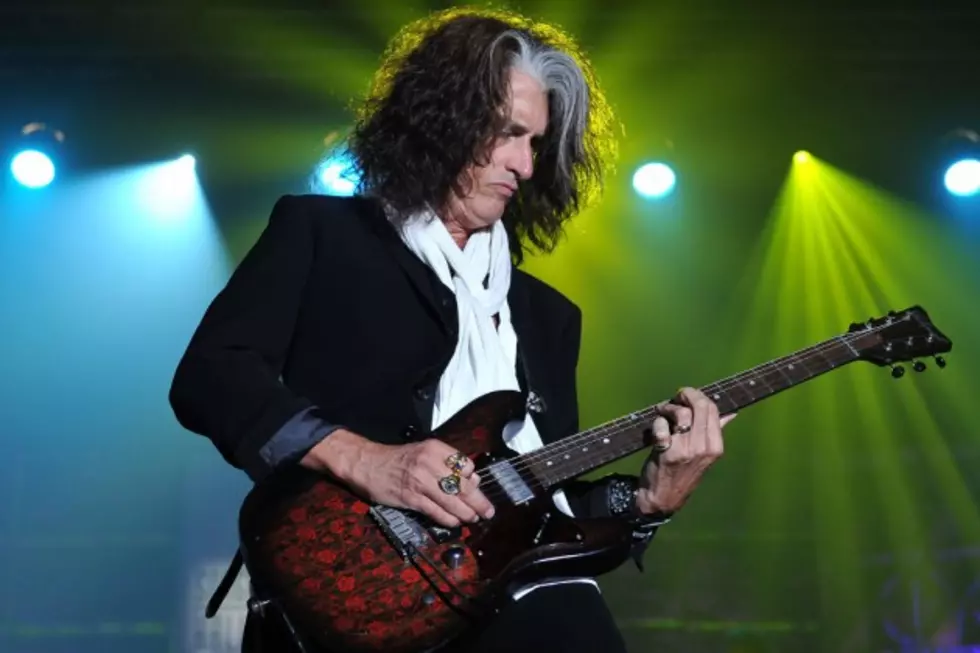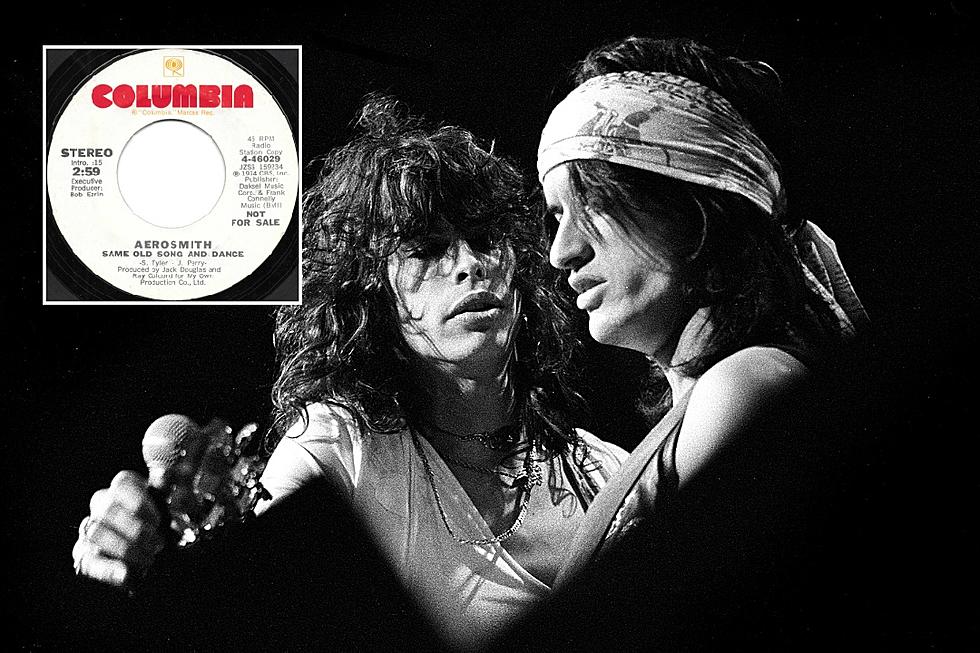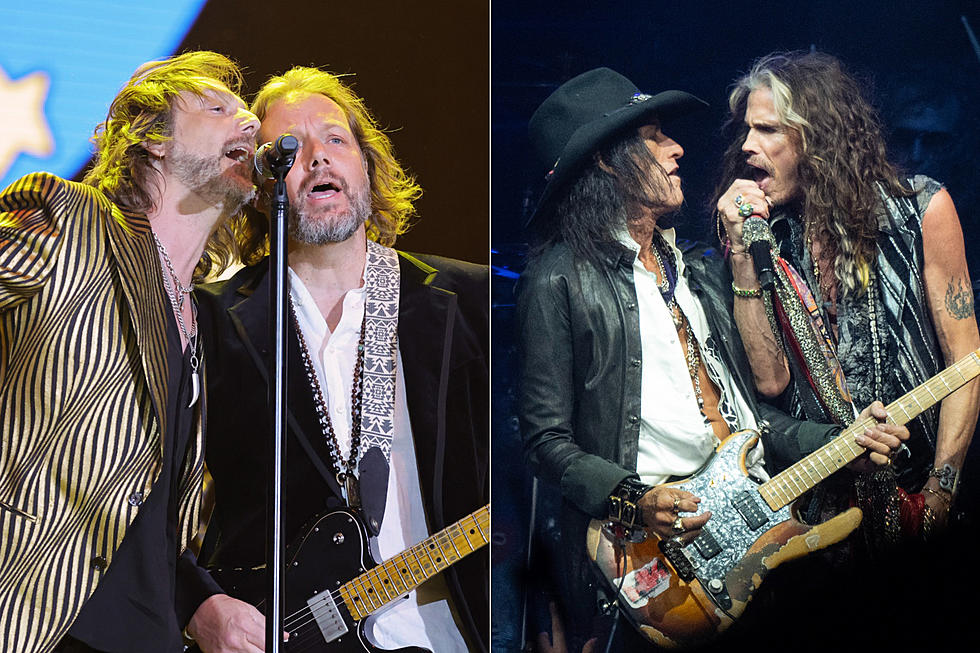
Joe Perry on Aerosmith’s Classic Years: ‘We Could Have Done More’ – Exclusive Interview
Throughout the history of Aerosmith, vocalist Steven Tyler has often been the outspoken member of the group. Which is why it’s great to hear more than a few words from guitarist Joe Perry in his new book ‘Rocks: My Life In And Out Of Aerosmith.’
For the first time, Perry lays his story out in-depth, revealing a younger version of himself that idolized Jacques Cousteau, built his own diving rig and and once had dreams of becoming a marine biologist. But thanks to neighboring kids who had electric guitars, Perry would ultimately take a different path.
It ended up being a smart move on Perry’s part, one which would put him in a commanding role as part of a band that has become one of the cornerstones of American rock and roll. After more than four decades, Aerosmith continues to inspire new generations with their music.
We recently had the chance to spend a few minutes with Perry conversing about his new book, which is now available in stores and online:
It’s great to talk to you about this book. I think it’s a book that a lot of folks have been waiting for.
Well, I have. That’s for sure! I just got mine about a week ago today, the complete and finished package. We’ve got a couple of them hanging around the house, and I pick it up and it’s like, “Holy s--t, that’s actually a book!”
I think people who have been looking forward to this book have kind of thought that this could be the most direct look that we’re going to get at the Aerosmith story -- and I don’t think the book falls short. It certainly delivers on that.
Yeah, this wasn’t really my objective for writing it, but I think that on one level, it’s probably the most accurate, as far as the timeline goes -- and it’s from my perspective, so I can’t really speak too much to [what was going on during] my time away from Aerosmith when I was doing the [Joe Perry] Project. But, then again, not much was ever put out there about what I was doing during those five years, except that I put out three solo albums and a lot of people came to see me play. But other than that, as far as being in the press, there really wasn’t much out there.
Being my autobiography, it’s from my point of view and having been one of the original co-founders of the band, I’m in a good position to kind of be the eyewitness from the very start. But also, from the very start, 64 years ago, it’s the story of how I ended up doing this. It starts at the very beginning with that kid grinning with the flintlock rifle in his hands. How the hell did I end up doing this for 42 years, you know what I mean? And I’m still going strong.
It has to be something for you to look back, when you’re doing a book like this and realize that you did five Aerosmith albums in five years, from that debut album in 1973 through ‘Draw The Line’ in 1977. That’s pretty incredible.
Well, yeah, but you know what? I think we could have done more. That’s one thing that I wish we could have done, was to spend a little more time in the studio and not taking quite as long to make records. Because I think that during that period, we were in such a creative space, but I think it was a double-edged sword.
I think it was important for us to be out there in front of the fans playing live, because it made us a better band and it also made us understand just what we were doing that was capturing the fans’ ears, because I wasn’t even clear about that until about the second or third record, you know -- coming from basically a non-musical background and just being a rock and roll fan. I think back, and maybe if we’d spent a little bit less time on the road and a little more time in the studio, there would have been some more of that stuff during that era.
But you know, it is what it is and you know, those songs have held their own, the ones that we did do. It’s how it is. We were kind of learning as we went, you know? We didn’t hit the first album with all of this studio knowledge on how we were going to make this record. It was really a learning process as we went along, and we kind of brought our fans with us.
The debut Aerosmith album is filled with songs that are both fan favorites and now classic, in the case of ‘Mama Kin’ and ‘Dream On.’ It’s hard to believe that the album wasn’t a slam dunk when it was first released, as you discuss in the book. It’s probably hard to know, when you’re just starting out in the business, whether something is going to be viable or not. Did you get a feeling at some point in those early years that it was heading in a direction that was worth sticking with?
I think it was as soon as we started playing together, even with the cover songs that we were doing. Because we knew the first thing was to get gigs and play some of the places that my bands had played and that Steven’s bands had played. I can remember when we first were going out there, some of the areas where I had played before, it was Joe Perry’s new band and when we went some places where Steven had played, it was Steven Tyler’s new band. That was enough of a reputation to get us bookings until we actually had a name and an entity and that kind of thing.
We were playing a lot of cover songs, but they were more esoteric kind of cover songs. If the club owners were calling for the Top 10 hits, we’d play songs by the [Rolling] Stones, but we’d play album cuts. As long as it got the audience up and dancing, that’s all the club owners cared about -- and it got us to kind of explore those songs and figure out what was going to be our sound. So it worked out to our advantage to kind of live a little bit more close to the bone, as opposed to some of our friends who were playing clubs in town and playing those cover songs on a nightly basis and frankly kind of burning out on working on their own material.
What we were able to do was work on the weekends, make enough money to pay the rent -- barely -- and then have the week to spend rehearsing, writing songs and trying out new vehicles for our band. We were trying to figure out our slot. I knew there was something that we could bring to the stage that I wasn’t hearing in some of those bands that we looked up to, and I knew we could add something to what was out there. I just didn’t know what it was, at that point.
When you have bands around you like the Who and the Rolling Stones and then, more recently around that time, like Led Zeppelin, how do you find the confidence in the material that you’re writing on your own at that point to feel like it’s measuring up to any of that?
Well, I can remember consciously trying to not play riffs that I was hearing on the records, you know what I mean? It was like, we never played Zeppelin songs. We played very few Stones songs, very few Beatles songs. I mean, we played more of the esoteric kind of songs by bands like Fleetwood Mac, and some of the album cuts from some of those kinds of bands.
They were danceable enough that we could catch the audience’s attention and keep them satisfied, but there was also something too that made it sound original. We would add enough of our own energy to those songs to make them our own. That has stood us well, up until now. When you’re playing rock and roll, it’s a really narrow vocabulary that you have -- but in that narrow vocabulary, there’s an infinite number of ways that you can go.
So it was about finding our place where you’re playing rock and roll with the twos and fours and the four on the floor on the bass drum and rockin’ out, but still it’s finding that melody that sounds like you’ve heard it before, but then you’ve never heard it before. That’s the challenge. That’s what makes songwriting as hard now as it was then.
In the book, you talk about the question that has never really gone away: “How long can this band stay together?" At the time the band really its way back to the top with 'Permanent Vacation' and 'Pump,' that was really a triumph -- considering everything that had come prior to that. With the amount of times that you have perhaps hit what could be termed as turbulent waters since then, what is it that really keeps you coming back around to put it back together?
I think it’s the excitement of going onstage and playing. Fortunately, we came up at a time when that was still the be all/end all of what a band did. I mean, you got together and played in front of a crowd and you tried to play songs that would capture their ear and and entertain them, and they’d walk away from the show remembering it. Hopefully, maybe one of those songs would stick in their ear, and they’d go out and buy an album. There were other bands doing the same thing, and there was that sense of competition. Sometimes it got personal and sometimes it was just part of the game. You just went out there and played your best to capture the audience.
So, that has stood as probably one of the strongest pieces to the puzzle all through the years. You know, whenever we’ve written songs, we’ve always had that in our minds. We’re going to go out there and potentially play these songs in front of a crowd. Hopefully, it’s going to catch their ear. There have been other influences, you know: Is this going to get on the radio? Is this going to do whatever it’s going to do in some other format? But bottom line, we’re going to have to get out there and play these songs, and hopefully capture the audience.
You know what? I don’t think that’s going to ever change -- all down the line. Whatever direction the music business takes, there’s always going to be that element of the live show. You know, when we were in Paris on the last tour three or four months ago, my youngest son -- he just graduated from Boston University, is a DJ and he’s got a following here in Boston and he goes out and does gigs and stuff at these raves and plays clubs and stuff -- he said, “Listen, there’s this great guy playing in Paris, called Danger.”
So, we went out to this club together and it was great, because if you had just changed the equipment onstage but watched the audience, you wouldn’t have been able to tell the difference between that audience and an audience in 1968. It was still about the energy and it was still about the unifying effect of everybody getting off on what was going on onstage. The beats per minute were probably around the same as far as unifying people, so it was really a fascinating experience -- and every chance I get to do that with my kids, who are into music, I do it. Because it’s really cool to see how things have evolved but then also have stayed the same.
There’s a story in the book about how you had to teach the Metallica guys how to play ‘Train Kept A Rollin’’ at the Rock and Roll Hall of Fame induction ceremonies. I would guess that you still enjoy the opportunity for that organic kind of interaction this far into things.
Oh yeah, I mean, it’s always there. You know, it’s one of the things that we learned early on: Keep your ears open and see what else is going on out there, because there’s no wrong way to do it. It’s a wide open field and Metallica has carved a niche for themselves that they’re a unique band. Even though they may not have the same kind of roots that I think that are so important, it certainly hasn’t affected their ability to entertain their fans and have people that live and die by their music. They’re incredibly confident musicians, and they get their music across.
It was just kind of ironic that we had Jimmy [Page], Jeff [Beck] and me and a couple other musicians who had ‘Train Kept A Rollin’’ and knew the whole history of it> You know, it started back in the swing era -- it probably started in the cotton fields back in the day -- and it transformed itself over the years to when the Yardbirds got a hold of it. And so the whole thing, the irony of standing there and seeing this younger generation struggling to learn the song that the rest of us, it was part of our blood -- I didn’t think there was anything wrong with it. I just thought it was kind of a unique observation. It was pretty wild and it turned into a trainwreck pretty fast, but you know, that’s part of what makes rock and roll exciting to me.
Is there enough material to do expanded reissues of the Aerosmith albums, similar to what Jimmy has been doing with the Led Zeppelin albums?
I wish there was. Because of our songwriting techniques, it was really tough in the early days. That’s why I wish we had been able to spend more time in the studio. We would go in the studio with probably four or five ideas for songs, which probably didn’t have lyrics, and we would hammer them out on the fly -- and then Steven would really beat his head against the wall to get the lyrics right, and as soon we hit the eight or 10 songs we needed to finish the record, we’d just walk out of the studio because it was such an effort to get it done.
We don’t have a whole packet full of outtakes of jams and things like that. I mean, we’ve searched everywhere. I just know from the way we made records that we just didn’t work like that. I think part of it was because of the slow learning curve of becoming recording artists and having that feeling and freedom in the studio, to other things, you know, the pressure to get back on the road. Because our conquering of the States was a step-by-step process.
It wasn’t like, say, Bruce Springsteen, who released a record and all of the sudden had all of these songs on the charts and was on the cover of Time magazine and became a national star overnight -- even though he spent his time in the clubs and worked hard. Anybody that says anybody made it overnight just kind of discounts all of that time you spend playing in the clubs and getting good. But you know, if you hit nationally, it can be perceived as "yeah, you become a big star overnight." Well, for us it was kind of like a chess game. We’d go from Boston to Detroit and if we’d do it by car and we’d end up playing all of the places in between, trying to grab every gig that we could.
Once we got to Detroit, OK, what’s the next big city after that? Well, Chicago obviously, so we’d go to Chicago and then we’d head south to Texas and down south of the Mason-Dixon line into Florida and all of that. How were these people down south going to perceive a rock band from the Northeast? So it was kind of a slow build before we even became a nationally known band.
More From Ultimate Classic Rock









